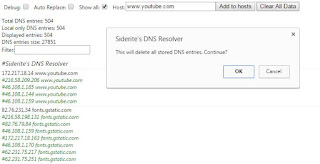DNS Resolver - A Chrome extension to help you with malfunctioning DNS or IP blocking.
 I've written another Chrome extension that I consider in beta, but so far it works. Really ugly makeshift code, but I am not gathering data about the way I will use it, then I am going to refactor it, just as I did with Bookmark Explorer. You may find the code at GitHub and the extension at the Chrome webstore.
I've written another Chrome extension that I consider in beta, but so far it works. Really ugly makeshift code, but I am not gathering data about the way I will use it, then I am going to refactor it, just as I did with Bookmark Explorer. You may find the code at GitHub and the extension at the Chrome webstore.This is how it works: Every time you access anything with the browser, the extension will remember the IPs for any given host. It will hold a list of the IPs, in reverse order (last one first), that you can just copy and paste into your hosts file. The hosts file is found in c:/Windows/System32/drivers/etc/hosts and on Linux in /etc/hosts. Once you add a line in the format "IP host" in it, the computer will resolve the host with the provided IP. Every time there is a problem with DNS resolution, the extension will add the latest known IP into the hosts text. Since the extension doesn't have access to your hard drive, you need to edit the file yourself. The icon of DNS resolver will show the number of hosts that it wants to resolve locally or nothing, if everything is OK.
The extension allows manual selection of an IP for a host and forced inclusion or exclusion from the list of IP/host lines. Data can be erased (all at once for now) as well. The extension does not communicate with the outside, but it does store a list of all domains you visit, so it is a slight privacy risk - although if someone has access to the local store of a browser extension, it's already too late. There is also the possibility of the extension to replace the host with IP directly in the browser requests, but this only works for the browser and fails in case the host name is important, as in the case of multiple servers using the same IP, so I don't recommend using it.
There are two scenarios for which this extension is very useful:
- The DNS server fails for some reason or gives you a wrong IP
- Someone removed the IP address from DNS servers or replaced it with one of their own, like in the case of governments censorship
I have some ideas for the future:
- Sharing of working IP/host pairs - have to think of privacy before that, though
- Installing a local DNS server that can communicate locally with the extension, so no more hosts editing - have to research and create one
- Upvoting/Downvoting/flagging shared pairs - with all the horrible head-ache this comes with
As usual, let me know what you think here, or open issues on GitHub.




0 comments:
Post a Comment